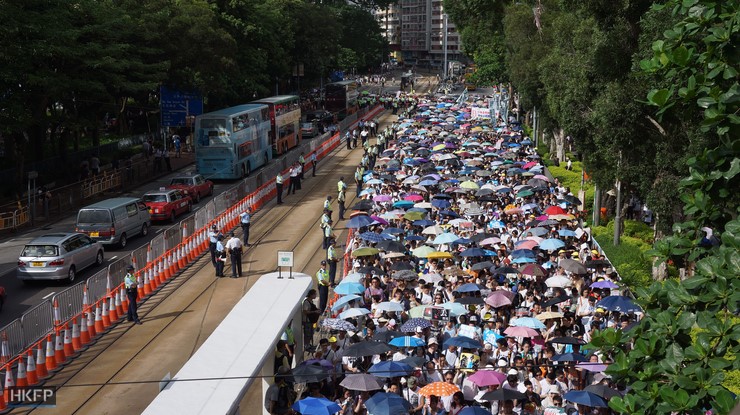The police have announced crowd control measures and special traffic arrangements for Hong Kong Island ahead of the annual pro-democracy protests on July 1. Preparations have also been made in relation to a protest event planned in Western District by localist groups, which police say organisers do not have permission for.
The official march, organised by the Civil Human Rights Front, will begin at Victoria Park and conclude at the Central Government Offices. The pedestrian crossing opposite the Causeway Bay SOGO store, as well as Sugar Street and Paterson Street, will be closed to prevent the public from joining the rally mid-way, which could obstruct the procession and cause confusion, police say.

Hong Kong Island Senior Superintendent of Operations Tse Kwok-wai said that groups wishing to apply for a promotional booth along the rally route should contact authorities and not block the road. Thirty or so booths – often used for fundraising by political parties and liberal causes – have been approved so far.
Around 2,000 officers will be deployed, according to sources cited by HK01.

Tse said that police are prepared in the event that participants attempt to occupy roads, although – from past experience – most participants will leave in an orderly fashion after the procession, he said. According to the organisers, it is likely that protesters will leave after reaching the endpoint near Harcourt Road, Admiralty, rather than gather and remain there, Tse said.
Three localist groups – Hong Kong Indigenous, the Hong Kong National Party, and Youngspiration – have called for protesters to gather outside the China Liaison Office in Western District on the night of July 1 to protest the Chinese government’s kidnap and detention of returned bookseller Lam Wing-kee – who will be leading the main procession that day. The groups have not applied for a notice of no objection with the police, which is needed for public meetings and processions.

“Regarding the activities that will take place in the Western District, we will make suitable preparations and conduct risk assessments based on the information from various parties. We’ll also have sufficient manpower to deal with any unexpected episodes,” Superintendent Tse told reporters on Wednesday.
Tse added that organisers of the protest at Western District – some of whom have a history of engaging in radical behavior – should contact the police so that the force can facilitate the activities in accordance with the law. He said that the police would not tolerate any acts that threaten public order.

Localist groups are pro-democracy but many consider traditional democratic activists and pan-democrats within the legislature to be ineffective. The camp is also tied with various movements related to the expansion of Hong Kong’s autonomy, for example advocating for city-state status or outright independence.
